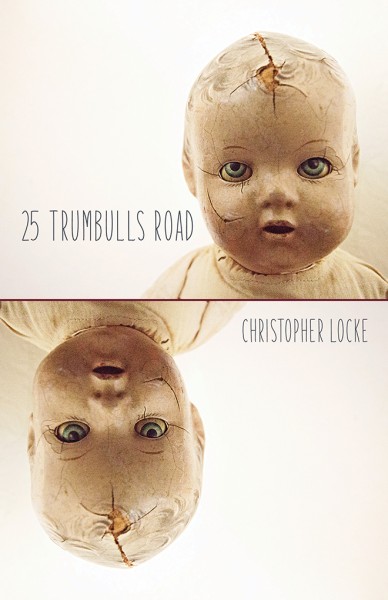
Reviewed by Beret Olsen
As I write, real-life horrors unfold on computer screens, in nursing homes, bank accounts, and tents pitched outside hospital doors. We are trapped in a sci-fi thriller in which the known world has been upended by isolation and exponential growth. So, full disclosure: I was already unsettled when I cracked open Christopher Locke’s new chapbook, 25 Trumbulls Road, and eager to tumble into his fictive universe. But I assure you, this is the perfect time for literary escape, and reading this winner of the Black River Chapbook Competition has transformed me into a new and enthusiastic fan of speculative literary fiction.
Twenty-Five Trumbulls Road consists of five chilling stories linked to a single house and its surrounding countryside. With the exception of the cover—which could easily provoke nightmares of its own—the formal presentation appears familiar and orderly. The text is divided into five “cases,” each further divided into a series of “exhibits.” Such lexical cues bring to mind a legal trial or a police procedural, sparking expectations for facts, foreshadowing, and, eventually, mysteries solved.
But slippage occurs between these expectations and the content that follows. The chapbook begins with Case 3, then proceeds with Case 8. Exhibits, too are skipped and—ominously—redacted. Stories are told in clumps of details that do not smooth into predictable story arcs. Since the cases span discrete time periods, with a shifting cast, the setting itself becomes not only the connective tissue, but also a main character: a Georgian two-story with wide pine-plank flooring, a large yard, and a row of plum trees, which bow “like the condemned before they’re led away.” So while one girl and her father are wrestling their own histories and demons, they do so near the gnarled apple trees we have visited five years previously, with another family. Years later, we’ll see those trees again under differing circumstances.
“It’s like we’re walking around in a photograph,” a character says in Case 8; it is a line that resonates throughout the twenty-two pages. Some details are in sharp focus—the exact time on the microwave clock, for example, or the precise look and location of a dishtowel—but much is missing. Readers must repeatedly fall out of the frame and into their own nightmarish imaginings, without the storyteller’s guiding, protective hand. Why was the woman who lives under the floor wandering on sore feet? Why and how did Mason appear on the security cam? And what happened to Zack? All we hear from him are “small, wet noises,” a turn of phrase I will not easily repress.
Clearly Locke is more interested in poking at the questions than providing answers, and his narrators are incapable of telling the whole story. They are neither methodical nor wholly rational, but damaged and dreaming. They are haunted, like their readers.
Note: The first case in the book was originally published in SmokeLong Quarterly as a short story titled, “Unconfirmed,” at which time the author was briefly interviewed about content, process, advice, and snakes.
_____________________
 Beret Olsen is a writer, a photographer, and the photo editor for 100 Word Story. Her art, essays, and fiction have appeared in publications including First Class Lit; Flash: The International Short-Short Story Magazine; the Masters Review; and her blog, Bad Parenting 101.
Beret Olsen is a writer, a photographer, and the photo editor for 100 Word Story. Her art, essays, and fiction have appeared in publications including First Class Lit; Flash: The International Short-Short Story Magazine; the Masters Review; and her blog, Bad Parenting 101.

